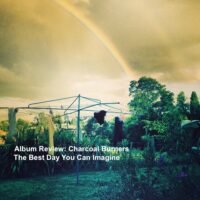
The new album, The Best Day You Could Imagine, is New Zealand post-punk/alt. rock band Charcoal Burners’ third album in a matter of two years. The band is located in the small countryside town of Dunedin, located on the southern region of the island nation.
TCB’s latest album, The Best Day You Could Imagine, is the final recording in a trilogy of albums written and performed by Andrew Spittle (vocals, guitar) with bassist and vocalist Sally Lonie, and a drummer simply known as ‘Finn.’
The L.P. kicks off with the fuzzy alt. rocker, “Winged Bird,” sporting a distinct melody hook, which is immediately followed by the dark, slow-burning rocker, “Battlescarred.”
For “Battlescared,” Spittle says, the lyrics needed some finishing touches so his teenage daughter helped out. “She did a great job,” Spittle writes. “I never write with other people; I just can’t emotionally own their lyrics, but these ones I can.” Right away the mood for the album is set by the two opening tracks.
The first official single from the album, “Days Behind,” is a mesmerizing track with interesting psych-rock guitar playing (almost sounds Middle Eastern) featuring a fairly long outro compiled of elements that include a solid rhythm and reverb-heavy melodies.
But it’s the transformative layers of guitar work that really takes hold here – and throughout the entire album. There are notable influences of 60’s psychedelia; 90’s alt. rock revival with elements of grunge.
The extended instrumental reverb-laden melodies offer a unique sense of rhythmic catharsis which is not commonplace in much of today’s rock music. The soft harmonic vocals fade in and out effortlessly to complete the effect.
Spittle says it’s an abstract recording of “how plastic bags that are trash can become birds.”
“If the electro dark-folk of Charcoal Burners (2017) was earth, and the glacial soundscapes of Orders From the House (2018) water, The Best Day You Could Imagine is fire,” he says.
The “Days Behind” single is artistic in a number of ways; there’s even Shakespearean tragedy within, featuring lines like ‘Have you no letters from the priest?’
In this case, Spittle says, the concept comes from Shakespeare’s Romeo & Juliet, wherein Shakespeare wrote:
“Eyes, look your last!
Arms, take your last embrace!
And, lips, oh you the doors of breath,
seal with a righteous kiss a dateless bargain to engrossing death!”
The brooding post-punk rocker with an alt. edge, “Deadass Sea” is reminiscent of Cormac McCarthy’s The Road with the nuclear winter that features a ‘dead ass sea.’ This is one of the top tracks on the album, and one could safely say also sports some 90’s Britpop influences.
Following is the upbeat, hazy pop-rocker, “Rings Run Circles,” with up swinging hooks and a tinge of Dinosaur Jr.
Despite this observation, the track, says Spittle, is a story of the summer of 1990 when he and friends were “listening to Zen Arcade and New Day Rising on a Walkmen, and falling in love for the first time.”
Regarding the agreeable slacker rock vibe of “Trailer Tragedies,” Spittle says: “There is an implied sense of character arc and backstory here, together with some niggly questions: ‘What have you done? What price have you paid? Was it worth it?'” What we hear is a solid smoky rocker of 80’s post-punk blended with unmistakable alt./grunge rock influences. The same is true on the standout track, “Reticent.”
The gloomy, almost haunting, song, “Darkroom,” has very much a Cure influence, complete with the angular, repetition guitar notes and slow brooding of the bass lines and drums.
According to the band, the song is apparently the strange tale of someone developing photos in a darkroom of another person at the same moment that same person unexpectedly and mysteriously appears at the other side of the darkroom’s door.
“I never write with other people; I just can’t emotionally own their lyrics, but these ones I can.”
“When I Whisper” is a tale of an anorexic teenage girl who doesn’t believe her father loves her, Spittle says. The track hums along with a bit more optimism and melodic hooks than other songs on the L.P., which is arguably ironic.
Next, with a sound completely relatable to bands like the Buzzcocks, “Tell You What I Could Do” bumps along on heavy guitar chords, bumbling bass lines, and nicely-timed drumming, while “Blind You” might remind some post-punk aficionados of Husker Du; and it is also one of the lighter, less grungey songs on the L.P.
The album closes with the wavy, unfocused, “Robbed and Beaten,” featuring a mean little riff and chord changes.
All in all, this is a solid album and a nice completion to Spittle’s trilogy. Post-punk and alt. rock/grunge fans are definitely the target audience here.
Basically, if you like dark, brooding, fuzzy guitar rock with a Dinosaur Jr. verve and the introspective, emo-like elements of bands like the Cure, you’re probably going to dig this album.
The album was produced by Thomas Bell (David Kilgour and the Heavy Eights, The Shifting Sands) and recorded at the iconic Chicks Recording Studio in Port Chalmers, Dunedin.
Fans of bands like the Cure, Joy Division, Husker Du, Echo and the Bunnymen, and Slowdive are main candidates to absorb TCB’s fantastic shoe-gaze post-punk sound. There is also a strong alt. rock vein that runs throughout the recording as well.
Charcoal Burners weave together rich shoegaze/post-punk tapestries with repetitive and fuzzy guitars, heavy reverb, grainy melodies, brooding bass lines and menacing, bleak, whispery vocals that altogether form a strong and cohesive recording and an album that is worth the time to listen to for fans of such music.
Spittle has previously opened for artists like Mark Kozelek (Sun Kil Moon; Red House Painters). His main influences are primarily Husker Du, My Bloody Valentine, and Red House Painters.
Another way to think of the band’s music is “to consider My Bloody Valentine covering Husker Du at the Overlook Hotel,” Spittle concludes.
Listen to the full album on Bandcamp
